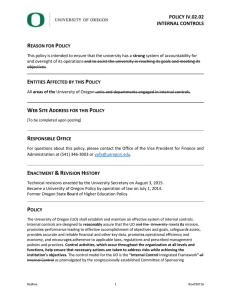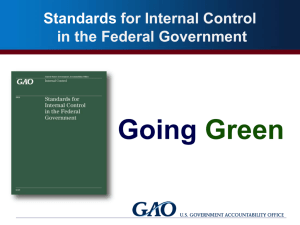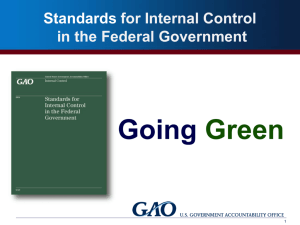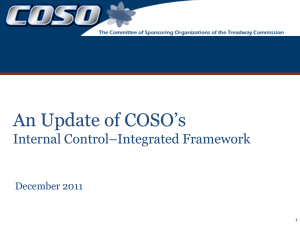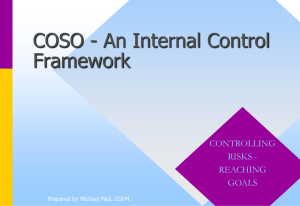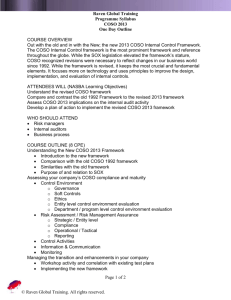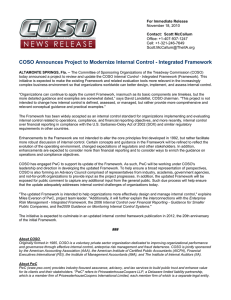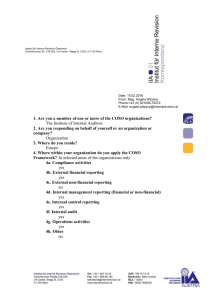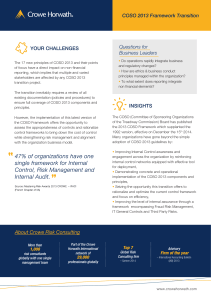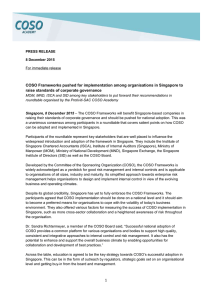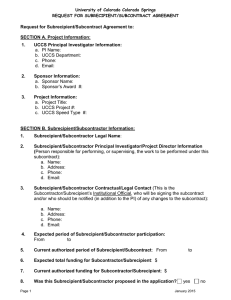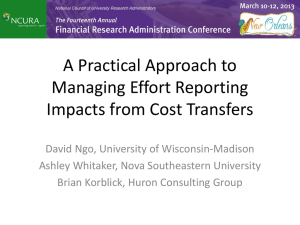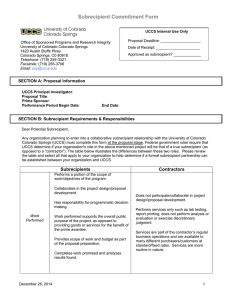UG – Impacts of the Uniform Guidance on Institutional
advertisement
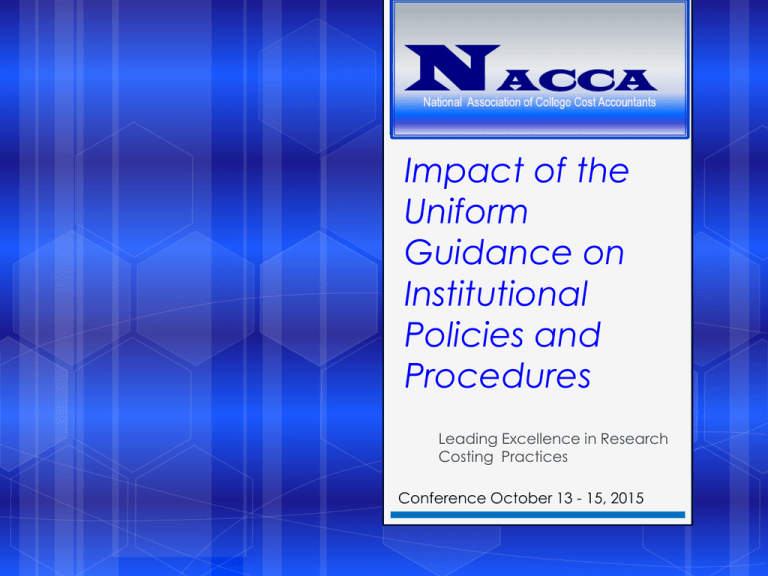
Impact of the Uniform Guidance on Institutional Policies and Procedures Leading Excellence in Research Costing Practices Conference October 13 - 15, 2015 Session Highlights Insights on internal controls - a key component of the Uniform Guidance (UG) Internal Controls – What Are They Really? Background & the Committee of Sponsoring Organizations (COSO) – the Treadway Commission Examples of Procedures/Internal Controls in Key Areas (e.g., Direct Charging, Personal Compensation - Effort Certification, Subrecipient Monitoring and so forth) Key policies and procedures impacted by the emphasis of internal controls in the Uniform Guidance Assess the strength of current institutional internal controls and conclude where enhancements are necessary 2 Background – Why All the Buzz? The Uniform Guidance increased emphasis on Internal Controls: 2 CFR Part 200 – 200.303(a) non-Federal entities MUST: Establish/maintain effective internal control over Federal awards These controls should be in compliance with the federal “Standards for Internal Control” from the Committee of Sponsoring Organizations (COSO) Numerous times that ‘internal controls’ are referenced in the Uniform Guidance Therefore, perhaps a best practice is to incorporate internal controls into University Policies and/or Procedures Must be Specific and verifiable --- Not just “Lip Service” 3 The Uniform Guidance and Internal Controls 4 The COSO Standards Background In 1992 COSO changed the way that auditors look at internal controls based upon several significant audit failures that occurred in the 1980’s, Internal control is broadly defined as a process effected by an entity’s management and other personnel, designed to provide reasonable assurance regarding effectiveness and efficiency of operations, reliability of financial representation and compliance with laws and regulations, overall safeguarding of assets Internal controls not only applies to institutions with higher education, but state, federal and corporate sectors as well, It is predicted that substantial audits will be performed for internal controls in all areas with your institution. 5 COSO “Framework” (Summarized) Major Components 1. The control environment which includes the integrity, ethical values and competence of an institution and its people 2. Risk assessment 3. Control activities 4. Information and communications that encompasses the methods for the identification, capture and communication of pertinent information in a timeframe that enables people to carry out their responsibilities 5. Monitoring All of the above combine to form an integrated system with controls, all five components must be present and functioning. 6 Types of Internal Controls Directive Designed to provide guidance to the entity over the business processes – helps to set the tone Preventive Designed to keep errors or irregularities from occurring in the first place Detective Designed to identify errors or irregularities Corrective Designed to fix errors or irregularities 7 Internal Controls and Procurement Property Equipment purchases are made in accordance with purchasing guidelines, properly authorized, and recorded Proper equipment object codes are used for equipment with a per unit cost of $5,000 or more and with a useful life of more than three or more years All University equipment have an asset tag Utilize an annual departmental inventory report is completed and returned to Property Control by the due date 8 Internal Controls and Direct Charging to Sponsored Awards Pre-Award systemic control for budgeting only Allowable costs Inclusion of proper explanations in grant Budget Narratives Review of all direct charged Clerical & Administrative salaries to grants Periodic review/approval of posted transactions by responsible/authorized personnel (departmental/central) 9 Internal Controls and Personal Compensation/Effort Certification Periodic reports of payroll / cost sharing for review & approval by faculty and departments Ensuring all researchers certify effort on each project and submission on a timely basis with proper approvals, including corrections Reviewing salary adjustments to ensure adjustments are timely as well as appropriately reflected and referenced on the effort cards Procedures to ensure salary for all faculty over the NIH salary cap is adjusted accurately 10 Internal Controls and Cost Transfers For transfers AFTER effort certification, proper review/approval BEFORE posting (e.g., PI, Dept Head, Dept Admin) SPA office review of ALL transfers processed AFTER Effort Certification (e.g., filing of revised effort statements) Processes/commitments to prevent future occurrences of late posting transfers 11 Internal Controls and Sub-recipient Monitoring Review financial and programmatic reports. Ensure that all required reports are completed accurately and in a timely manner. Follow up on deficiencies. Confirm that subrecipients are taking timely and appropriate action on any deficiencies detected through audits, onsite reviews and other means. System of Approval. Verify satisfactory performance prior to university payment. 12 Some Specific Topics and Uniform Guidance Impacts 13 Compensation – Personal Services 200.430 Policy – mention all items in UG – sabbatical, IBS, extra service, incidental, etc. Standards of documentation – map processes to make sure current environment meets these requirements Monitoring Controls 14 Direct Costs 200.413 – Administrative Costs Computing devices Visa costs Participant support Exchange rates Others of concern at your institution Monitoring Controls 15 Subrecipient Monitoring 200.92 Subawards 200.93 Subrecipient 200.330 Subrecipient monitoring & contractor determination 200.331 Requirements for pass-through entities Monitoring Controls 16 Other Uniform Guidance Impacts/Considerations Procurement – if grace period runs out and we have to implement Dependent Care Costs – institutional decision so that consistent – consider costs to institution, how to implement Fixed price agreements 17 Mitigating Risk Policies Education Procedures Buy Monitoring System Controls Peer Reviews in Roles & Responsibilities Self Assessment Tools Your Institutional Challenges 18 19 Presenters Steve Bradley, Director Maximus Kevin McHugh, Managing Director Navigant Trudy Riley, Associate Deputy Provost, University of Delaware, CRA, CPRA Sharon Brooks, Deputy Director – OSP Duke University, CIA, CRA, CFRA 20

